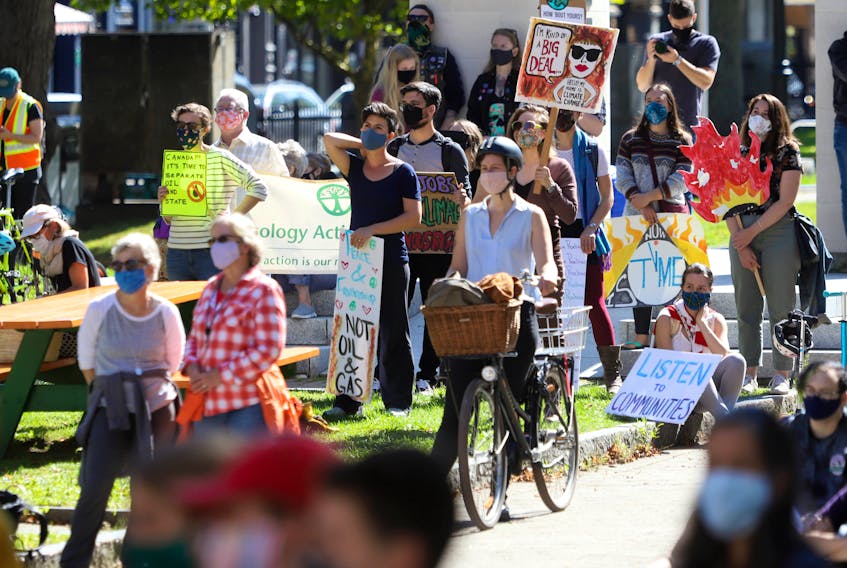The recent NASA analysis that cast 2020 in a tie for the warmest year on record is alarming, says a Dalhousie University professor.
“The fact that 2020 tied with 2016 for the warmest year on record shows that we are on a dramatic warming trend, that has sped up since 2015,” said Shannon Sterling, an associate professor in the Halifax university’s earth and environmental sciences department.
“The record high temperatures in 2016 were helped by a strong El Nino. There was no El Nino to help 2020 record highs, which indicates that the baseline temperatures are changing.”
The NASA Goddard Institute for Space Studies (GSIS) released data last week that found the globally averaged temperature for 2020 was 1.02 degrees Celsius warmer than the 1951-1980 baseline mean, effectively tying it with 2016 for the warmest year on record.
“The last seven years have been the warmest seven years on record, typifying the ongoing and dramatic warming trend,” GISS director Gavin Schmidt said. “With these trends, and as the human impact on the climate increases, we have to expect that records will continue to be broken.”
The Earth’s temperature has risen more than 1.2 degrees since the late 19th century and the primary generator for that change is considered to be human activities.
Rising temperatures are causing a loss of sea ice and ice sheet mass, sea level rise, longer and more intense heat waves and shifts in plant and animal habitats.
“If you look at the time series published by NASA, there is a big jump in mean annual temperature in 2015, and each of the six years since has maintained record-breaking high temperatures, showing 2015 was not a one-time anomaly,” Sterling said. “The fact that 2020 tied for the warmest year with 2016 was particularly surprising, because 2020 was a strong El Nina year, which promotes cooler temperatures, while 2016 was an El Nino year, which promotes warmer average temperatures. Having a record warm temperatures during an El Nina year, like in 2020, is highly unusual.”
Sterling said 2020 temperature increases were highest in Siberia, with temperatures greater than five degrees above the long-term average.
“This is a stark reminder that Arctic warming is happening three times faster than the rest of the world,” Sterling said. “Probably not coincidentally, Siberia was also struck by wildfires over the summer. In 2020, wildfires in the Arctic set the record for the amount of CO2 (carbon) emissions in the Arctic, exceeding the previous record year (2019) by over a third. These emissions, of course, unfortunately, will cause a further increase in warming.”
Sterling also pointed to record fires in 2020 in the largest wetlands of South American, in Australia and in the western United States.
“Remember the terrible air quality that affected North America from the western U.S. fires, causing air quality warnings in Vancouver, and even hazy skies all the way to Nova Scotia,” Sterling said.
Sterling said 2020 also marked a record hurricane season with warmer ocean temperatures causing hurricanes to become more intense.
“All in all, we risk large, currently populated parts of our planet becoming uninhabitable if we do not contain the current warming trends.”
“The fact that 2020 tied for the warmest year with 2016 was particularly surprising, because 2020 was a strong El Nina year, which promotes cooler temperatures, while 2016 was an El Nino year, which promotes warmer average temperatures. Having a record warm temperatures during an El Nina year, like in 2020, is highly unusual.”
Shannon Sterling, Dalhousie professor
An example of the ramifications is a recent immigration case in France in which a Bangladeshi man with asthma avoided deportation from France after his lawyer argued that he risked a severe deterioration in his condition, and possibly premature death, due to the dangerous levels of pollution in his homeland.
The appeals court in Bordeaux overturned an expulsion order against the 40-year-old man.
The lawyer had argued the link between migration and environmental degradation is clear.
“As global warming makes parts of our planet uninhabitable, mass migration will become the norm,” the lawyer argued. “Air and water pollution do not respect national boundaries.”
Sterling said Global Affairs Canada points out that developing countries are expected to be hit hardest by climate change, and they are the least able to afford its consequences.
“We are fortunate that Nova Scotia has not been identified as a hotspot for future warming or droughts,” Sterling said. “While we will have to battle rising seas and increased hurricane intensity and frequency, being surrounded by the ocean provides us more protection from low-level particulate air pollution that is the issue in the French immigration case.”
Sterling said the entire globe will be forced to grapple with “serious moral questions on the humanitarian issues of climate refugees in the very near future.”
Sterling takes some solace from recent work by Damon Matthews at Concordia University that shows, with the impacts of COVID-19 in 2020, global fossil fuel emissions dropped by seven per cent relative to 2019 emissions, the largest relative fall since the Second World War.
“This annual drop puts us on a trend of CO2 emission reductions that are sufficient to maintain warming to the vital target at or below 1.5 Celsius,” thereby avoiding the worst climate impacts, Sterling said.
Sterling said it required the heavy toll from COVID-19 to cut emissions.
“Given how much our lives and travel drastically changed last year, we were hoping for a greater emissions reduction,” Sterling said. “It's sobering to have last year as an example of the massive changes we need to make to reduce the worst threats of climate change.”









